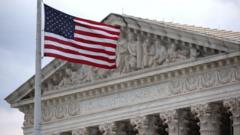In a significant ruling from the US Supreme Court, the proposal for the nation’s first taxpayer-funded religious charter school in Oklahoma has been blocked. The justices, unable to reach a consensus, voted 4-4, thereby upholding a previous decision from the Oklahoma State Supreme Court, which determined that the establishment of such a school would violate the First Amendment of the US Constitution.
The charter school, intended to be operated by the Catholic Archdiocese of Oklahoma City alongside the Diocese of Tulsa, sought approximately $23.3 million in state funding over a five-year period. Charter schools, while financed by taxpayers, are managed independently and have become a point of contention in the field of education in America.
Although the Supreme Court's decision does not set a national precedent, it reopens discussions surrounding the intersection of state funding and religious education. During an April hearing, justices seemed divided along ideological lines, and the absence of Justice Amy Coney Barrett from the case has sparked curiosity regarding her views.
Oklahoma Attorney General Gentner Drummond, who initiated the legal challenge against the charter school, expressed satisfaction with the ruling, framing it as a victory for religious liberty and a protective measure for taxpayer interests. "The Supreme Court's decision ensures that Oklahoma taxpayers will not be forced to fund radical Islamic schools," he stated, emphasizing the importance of maintaining constitutional principles.
Conversely, the proponents of the charter school argued that the refusal of funds based on their religious affiliation constituted discrimination. They expressed disappointment in the ruling and reiterated their commitment to offering educational options that integrate religious teachings. To adapt, the school officials declared plans to explore virtual education opportunities catering to approximately 500 students from kindergarten through high school.
The establishment of this charter school had previously stirred debate in Oklahoma, where its approval was welcomed by Governor Kevin Stitt, while Attorney General Drummond vehemently opposed it, leading to his eventual lawsuit. As charter schools attract increasing attention, particularly from conservative circles advocating for parental control in education, the implications of this ruling may resonate beyond Oklahoma.



















